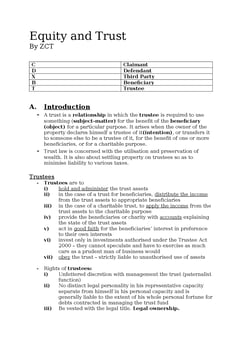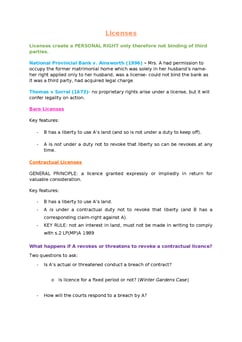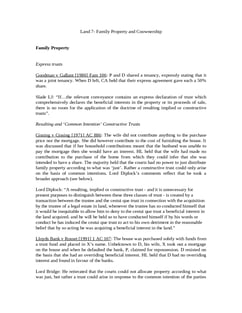Goodman v Gallant [1986] Fam 106
Judgement for the case Goodman v Gallant
Table Of Contents
KEY POINTS
Severance can occur if there's a conveyance to the plaintiff and defendant as joint tenants, disrupting their shared ownership.
The terms in a declaration of trust may conclusively determine the beneficial interests of the parties involved. Conveying land held on trust for sale can impact the severance of joint tenancy by altering ownership dynamics.
Beneficial interests in joint tenancy affect the plaintiff and defendant's respective rights to the property. There's no legal requirement for the plaintiff and defendant to hold on trust for themselves as joint tenants; it depends on the circumstances.
Severance is a crucial concept in joint tenancy, as it can change the nature of ownership and property rights. Conveying land to a third party can impact the severance of joint tenancy, potentially leading to a tenancy in common.
Specific laws or regulations may govern the severance of joint tenancy, depending on the jurisdiction.
The determination of parties' beneficial interests in joint tenancy can significantly influence the overall outcome of the legal case, affecting property division or rights.
FACTS
In 1960, the plaintiff and her husband purchased a house. However, the property was conveyed solely in the husband's name, despite an agreement that the plaintiff was entitled to a half share of the beneficial interest. In 1971, the husband left the plaintiff, and she started living on the property with the defendant.
In 1978, the husband conveyed the property's freehold to the plaintiff and the defendant as beneficial joint tenants on trust for sale. The conveyance included a provision allowing for the postponement of the sale. It stated that the net sale proceeds would be held on trust "for themselves as joint tenants."
In 1983, the plaintiff served a notice of severance of the joint tenancy on the defendant and filed a summons to determine their respective beneficial interests. She argued that she was entitled to three-quarters of the beneficial interest in the property. Her contention was based on the belief that she already owned a half share and that the joint tenancy should only extend to the half share received from her husband.
The registrar initially ruled that upon the severance of the joint tenancy, the plaintiff and defendant held the property on trust for themselves as tenants in common, with equal shares. The plaintiff appealed this decision, but the judge upheld the registrar's ruling.
The plaintiff then took the case to the Court of Appeal, arguing that the declaration of trust in the conveyance did not affect her entitlement to a three-quarter share in the beneficial interest after the joint tenancy was severed.
JUDGEMENT
It is clear that when a conveyance into joint names explicitly states that the parties are to hold the proceeds of sale as joint tenants, a tenancy in common is created upon severance. It is important to note that the doctrines of resulting, implied, or constructive trusts cannot be invoked when an express declaration comprehensively outlines the beneficial interests in the property or its proceeds of sale. In other words, such a declaration is exhaustive and conclusive unless the conveyance is set aside or rectified.
Therefore, based on these principles, the defendant is entitled to a half share of the beneficial interest in the property. Consequently, the plaintiff's appeal must be dismissed.
COMMENTARY
Plaintiff and her husband buy a house together. The property was registered in the husband's name, even though they agreed that she should have a half share of the beneficial interest. The husband decided to leave the plaintiff and go on. In 1978, the husband transferred the property's freehold to the plaintiff and the defendant as beneficial joint tenants on trust for sale.
In 1983, the plaintiff served a notice of severance of the joint tenancy on the defendant and filed a summons to determine their respective shares.
The registrar initially rules that once the joint tenancy is severed, the plaintiff and the defendant hold the property as tenants in common, with equal shares. plaintiff isn't satisfied and appeals this decision.
When a conveyance into joint names explicitly states that the parties should hold the sale proceeds as joint tenants, a tenancy in common is created upon severance. The doctrines of resulting, implied, or constructive trusts can't be invoked when an express declaration clearly outlines the beneficial interests in the property or its proceeds of sale. In simpler terms, that declaration is the final word unless the conveyance is set aside or rectified.
Based on these principles, it's clear that the defendant is entitled to a half share of the beneficial interest in the property. As a result, the plaintiff's appeal was dismissed.
ORIGINAL ANALYSIS
Plaintiff and Defendant shared a tenancy, expressly stating that it was a joint tenancy.
When Defendant left, CA held that their express agreement gave each a 50% share.
Slade LJ
If…the relevant conveyance contains an express declaration of trust which comprehensively declares the beneficial interests in the property or its proceeds of sale, there is no room for the application of the doctrine of resulting implied or constructive trusts.
For Further Study on Goodman v Gallant

Equity notes fully updated for recent exams at Oxford and Cambridge. Th...
Need instant answers? Our AI exam tutor is here to help.
Ask questions 🙋 Get answers 📔 It's simple 👁️👄👁️
Our AI is educated by the highest scoring students across all subjects and schools. Join hundreds of your peers today.
Get StartedSimilar Cases
Related Product Samples
These product samples contain the same concepts we cover in this case.
| Property Law | Co Ownership Notes (13 pages) |
| Trusts and Equity | Trusts Of The Family Home Notes (21 pages) |


 Since 2010, Oxbridge Notes has been a trusted education marketplace, supplying high-quality materials from top achievers at universities like Oxford, Cambridge, LSE, Harvard, and Yale.
Since 2010, Oxbridge Notes has been a trusted education marketplace, supplying high-quality materials from top achievers at universities like Oxford, Cambridge, LSE, Harvard, and Yale.